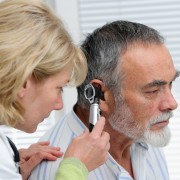Health & Wellness , Ear Nose & Throat
A reason to listen
Solutions to preserve and restore hearing

Losing your hearing can happen for various reasons but is usually related to the primary functions of the ear, says Adjunct Associate Professor Low Wong Kein, senior consultant ear, nose and throat surgeon at Novena ENT – Head and Neck Surgery Specialist Centre.
Symptoms that can be associated with deafness include tinnitus (a ringing sound in the ear) and vertigo (the sensation of giddiness brought about by a loss of balance). Sometimes, these symptoms point to an infection, benign growth, or even cancer.
Causes of hearing loss
Treatment for hearing loss depends on how it comes about. There are two types of hearing loss, explains Professor Low. The first is known as conductive hearing loss. It occurs when sound does not get from the outer to the inner ear.
“The ear is divided into three parts: outer ear, middle ear and inner ear. When sound enters the outer ear, it causes the eardrum to vibrate,” he says. “This vibration is transmitted in the middle ear to the inner ear, whereby cells in the inner ear convert this movement energy into electric signals so that it can be transmitted to the nerves and to the brain.”
Conductive hearing loss can occur in instances where the external ear canal gets blocked by substances such as earwax. Sometimes, an infection could be the culprit. This can happen if the eardrum becomes perforated. At other times, the bones in the middle ear, called ossicles, simply lose the ability to transmit the vibration well.
Another type of hearing loss is known as sensorineural hearing loss, which happens when the cells in the inner ear become damaged. Professor Low says this is usually caused by ageing or excessive exposure to noise.
To confirm this hearing loss and ascertain its severity, hearing tests must be performed. Further tests may be necessary, such as an MRI scan if a tumour in the hearing nerve is suspected, or a blood test to check for medical conditions such as autoimmune disorders.
How to treat hearing loss
Patients whose hearing loss is diagnosed as caused by an infection will be prescribed medication. This might include steroids, which are injected into the middle ear through the eardrum, where it will become absorbed by the inner ear.
If the patient has a perforation in the eardrum that impairs hearing, this can be restored with surgery, known as a myringoplasty.
For patients whose hair cells in the inner ear have become irreversibly damaged, making treatment by medication ineffective, a hearing aid is usually recommended. A hearing aid amplifies sound so it becomes easier for the ear to pick up.
“For patients with severe to profound hearing loss, hearing aids will not be adequate because there are insufficient cells in the inner ear to pick up and transmit sound,” says Professor Low. “These patients can consider a cochlear implant – it electrically stimulates the hearing nerve without relying on the cells in the inner ear. It was introduced almost 20 years ago and results have been extremely encouraging.”
How it works: the internal component is implanted into the ear via surgery while the external component is applied behind the ear and onto the scalp post-surgery. Sounds are received by the external component, processed and sent via radio waves to activate the internal component, which stimulates the hearing nerve.
Interestingly, Professor Low believes the future of hearing loss treatment in certain conditions lies in the past. “There are some ear disorders that remain not understood even in this day of advanced science and medicine, which limit modern methods of treatment,” he says.
“Acupuncture has been practised in China for more than 2,000 years with reported successes in these conditions. With an East-West treatment approach we can complement Western medicine with acupuncture.”

Novena ENT - Head & Neck Surgery Specialist Centre
Main Clinic:
Mount Elizabeth Novena Specialist Centre
38 Irrawaddy Road #04-21/22/34
Singapore 329563
Tel: +65 6933 0451
Satellite Clinic:
Parkway East Medical Centre
319 Joo Chiat Place #03-07
Singapore 427989
Tel: +65 6346 7761
Email: enquiry_peh@novena-ent.com
www.novena-ent.com
Related Articles
Health & Wellness
How to Deal with Obesity & Diabetes?
The prevalence of obesity in the world have continued to increase significantly. It is estimated by WHO that 39% of adults aged 18 years and over were overweight in 2016, and 13% were obese.
Read moreHealth & Wellness
DOES A QUICK WEIGHT LOSS PROCEDURE REALLY EXIST?
Depending on your objective, a quick weight loss may not be a myth after all.
Read moreHealth & Wellness
Sustainable Weight Management
Making Weight Management a Long-Term Journey.
Read moreLatest Articles
Medical Care
Clinical Exercise Physiologist (CEP): The Emerging of Exercise is Medicine
How Exercising can be a Medicine
Read moreMedical Care
Reversing type 2 Diabetes: Embracing Hope and Determination
Experience the remarkable journey of Ash and his grandfather Atok as they conquer type 2 diabetes through unconventional methods, showcasing the power of love and determination over adversity.
Read moreMedical Care
Bladder Cancer: What You Need to Know
Empower yourself with our comprehensive guide to bladder cancer. Explore symptoms, diagnosis, treatments, and supportive resources to safeguard your health.
Read more